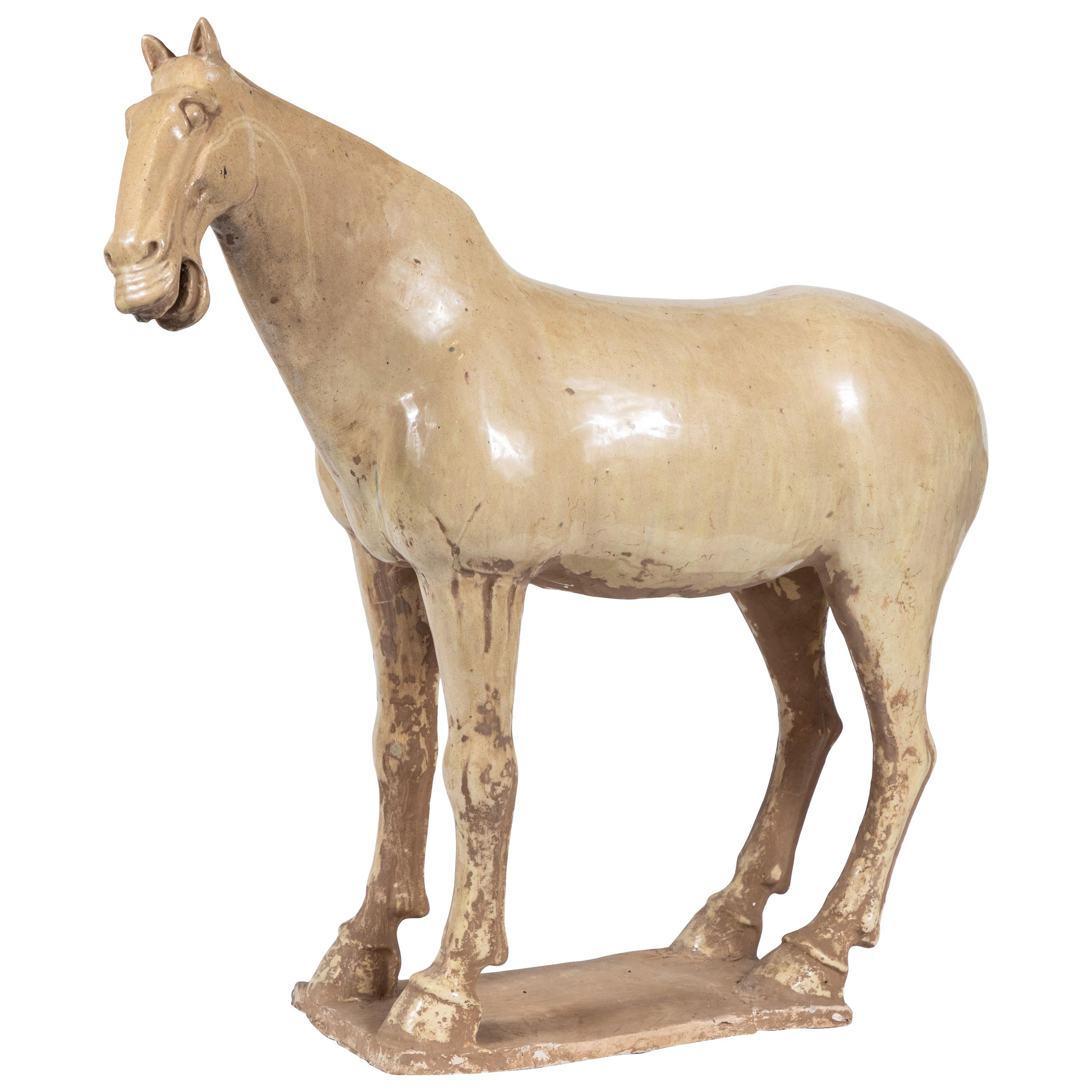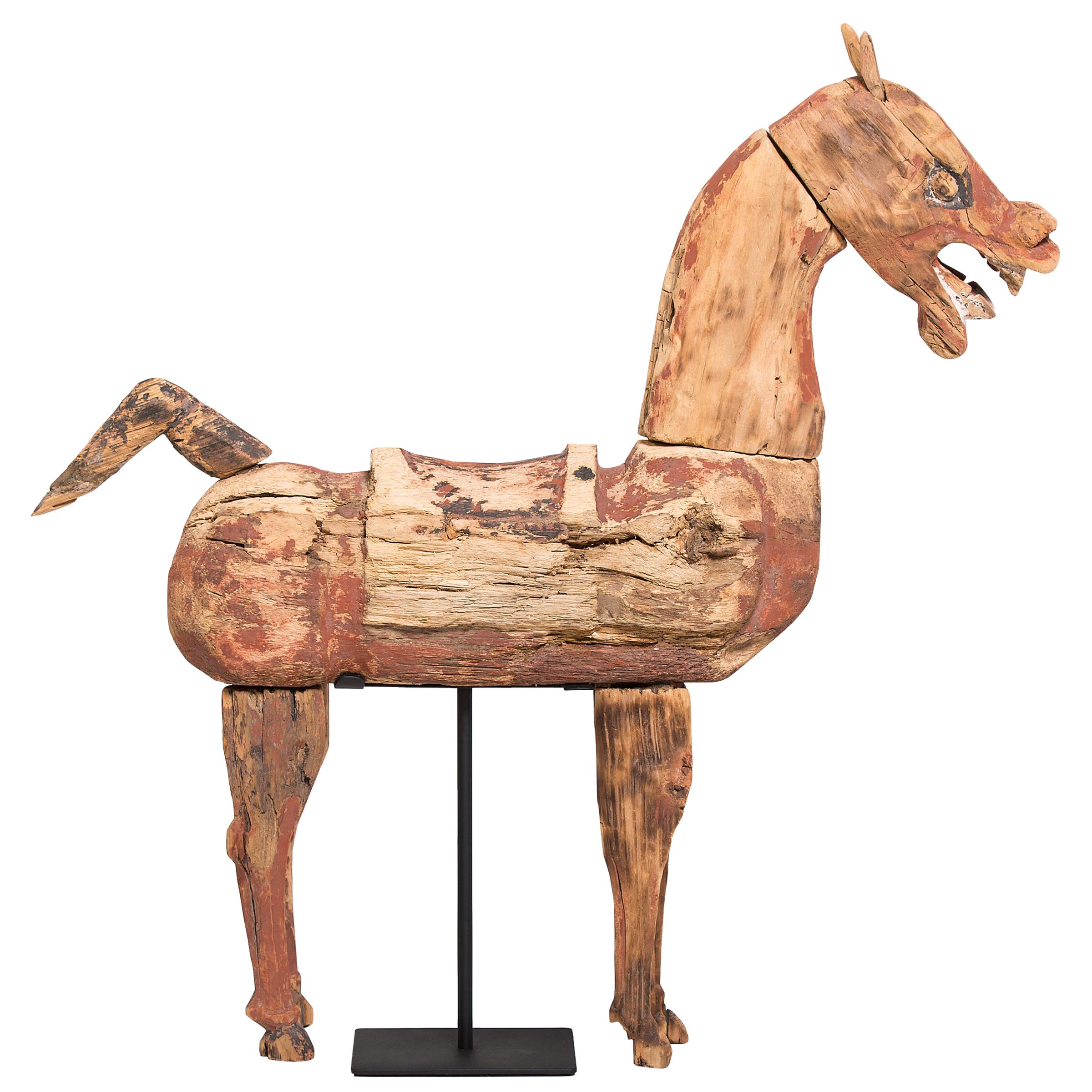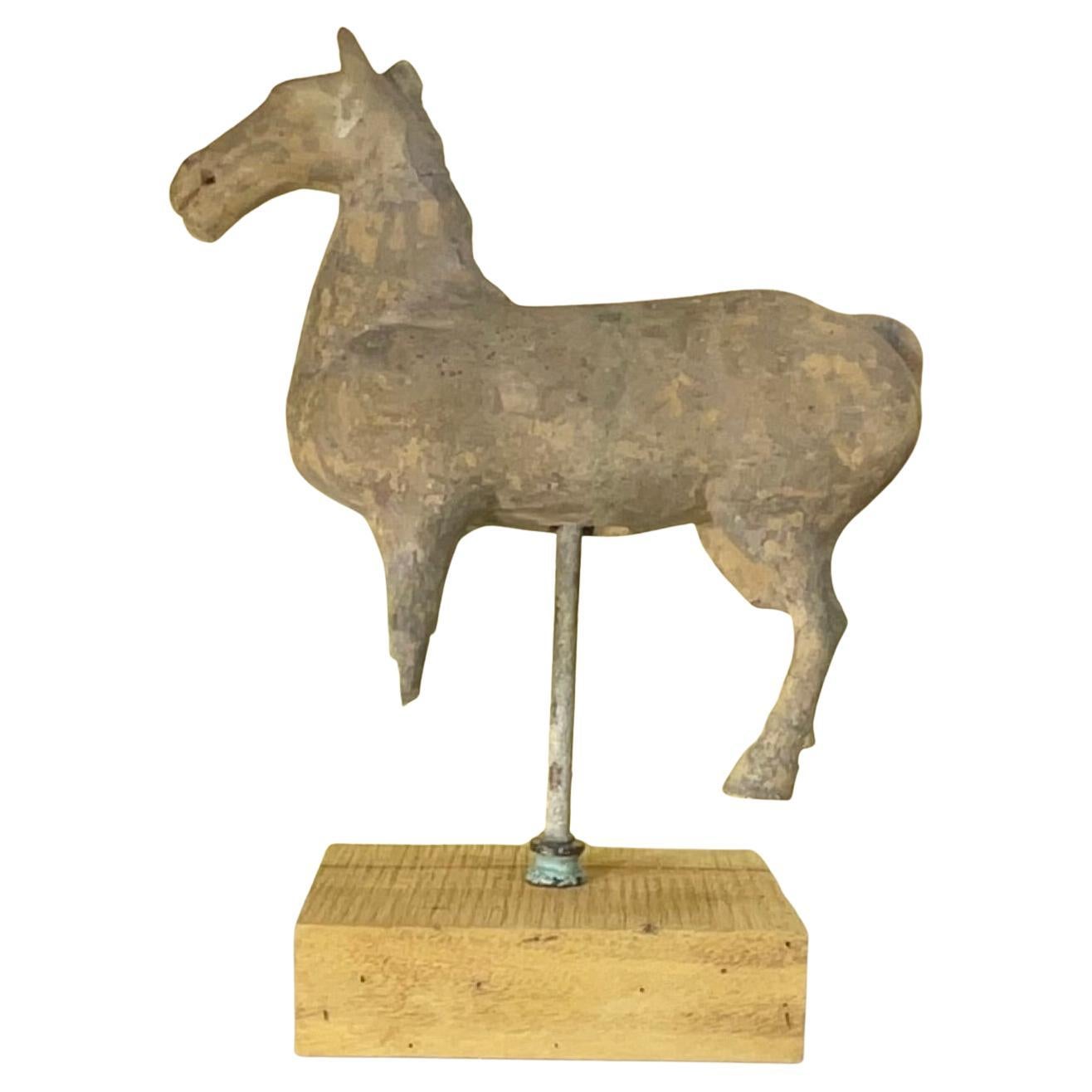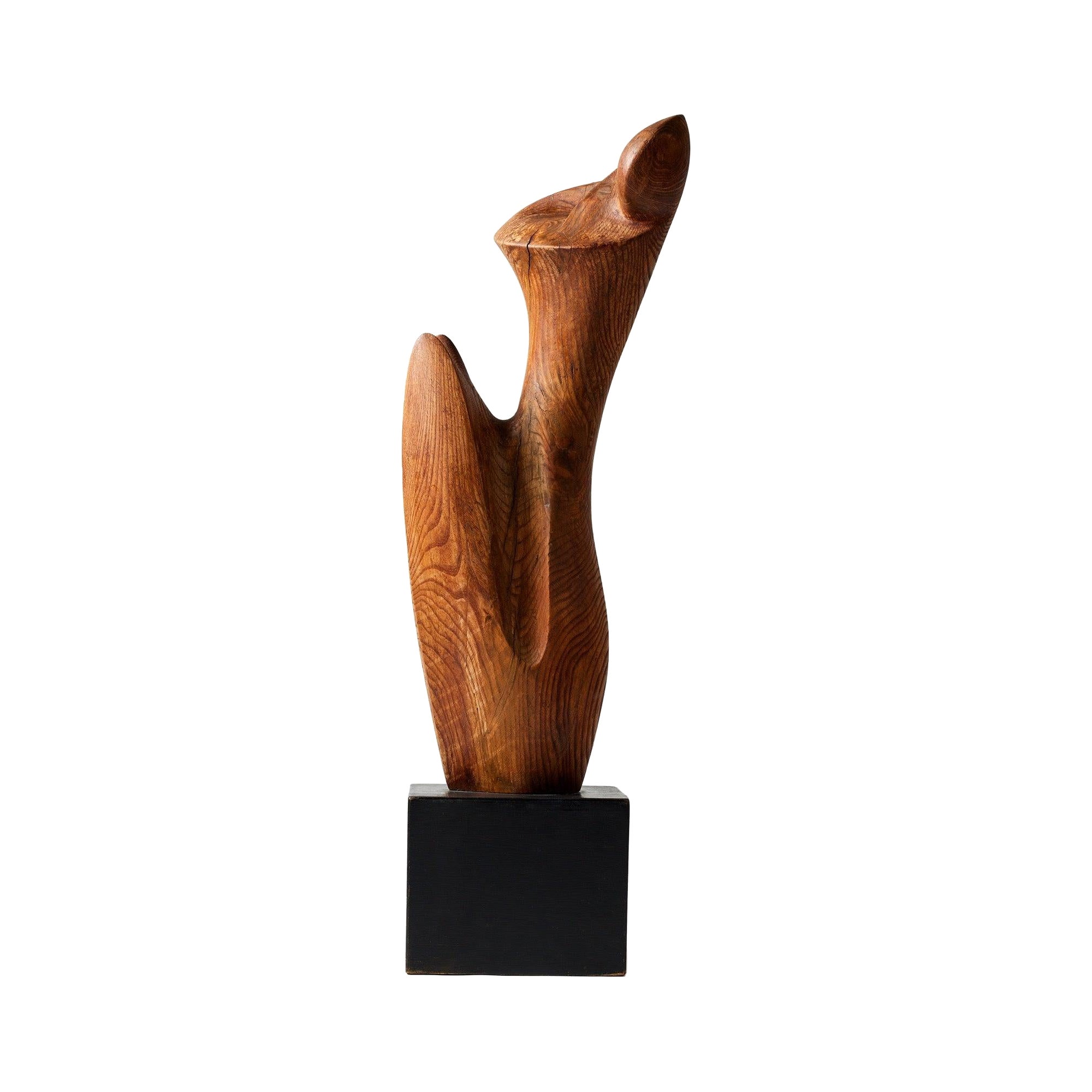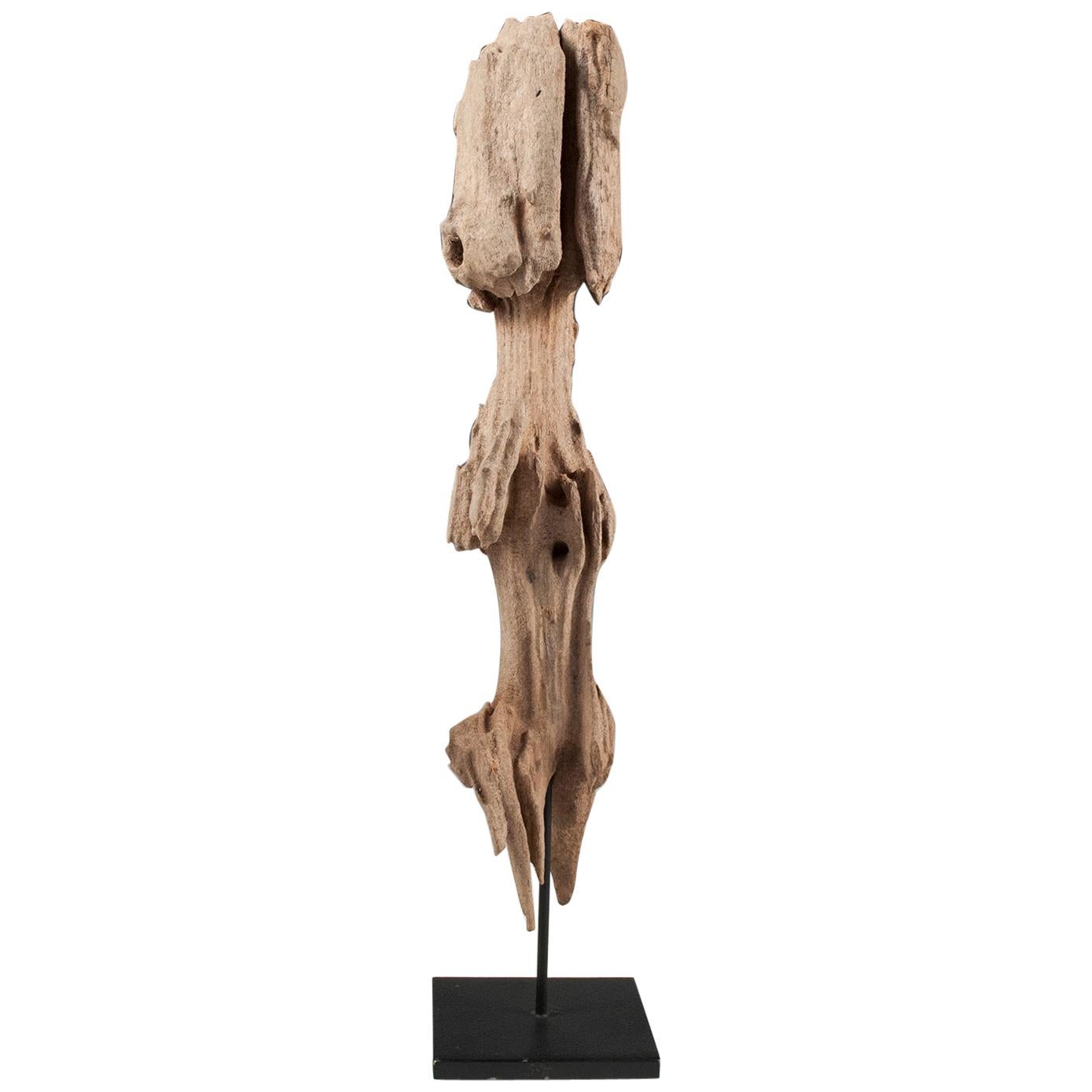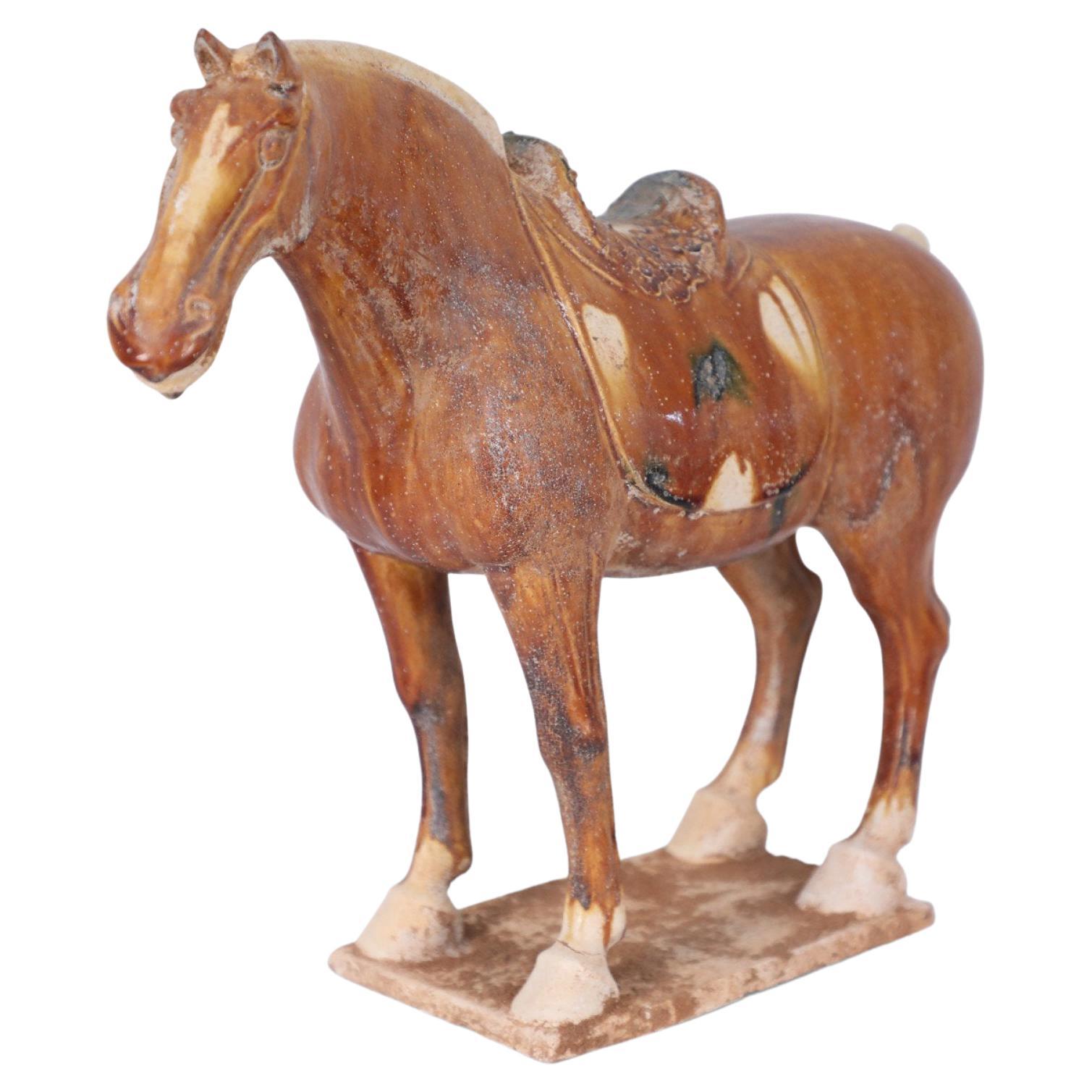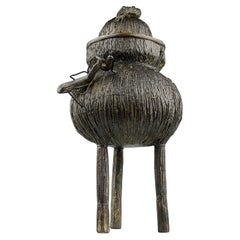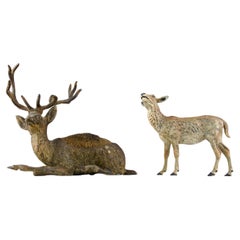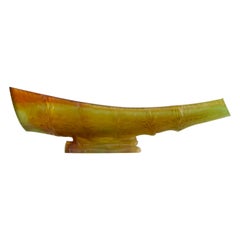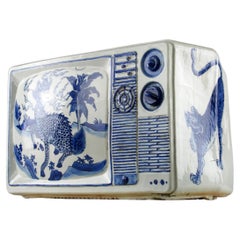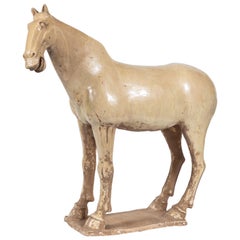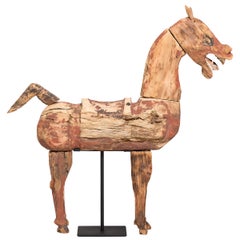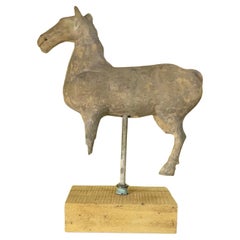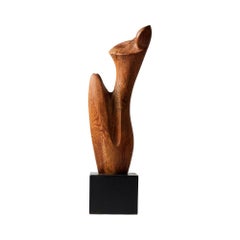Items Similar to Han Dynasty, Laying Doe Wood Sculpture, China 100AD
Want more images or videos?
Request additional images or videos from the seller
1 of 12
Han Dynasty, Laying Doe Wood Sculpture, China 100AD
$21,970.35
£16,264.36
€18,500
CA$30,269.84
A$33,724.88
CHF 17,605.98
MX$409,464.93
NOK 221,295.69
SEK 209,178.19
DKK 140,862.28
About the Item
Superb sculpture of a laying doe from the Chinese Han Dynasty (206BC-220AD). Remainders of polychromic paint, namely red, symbol of good fortune and joy as well as the season of summer, and green, symbol of vigor and vitality and the season of spring. Mounted on base.
A similar sculpture in bronze is kept at the Met Museum with the following description " A low bed, small table, and screen were often the only furnishings in a Han-dynasty room. The floors were generally covered with mats kept in place with weights in the shape of single animals, fighting beasts, or entertainers."
Condition seen in pictures.
Dimensions in cm ( H x L x l ) :
- Sculpture : 35 x 40 x 10
- With base : 45.5 x 44 x 15
The Han Dynasty ruled China from 206 B.C. to 220 A.D. and was the second imperial dynasty of China. It is known for its promotion of Confucianism as the state religion and opening the Silk Road trade route to Europe, permanently altering the course of Chinese history. Han Dynasty art and inventions like paper still influence the world today.
From the Han Dynasty to the present, deer can be found in many materials and media—rock crystal, nephrite, ink on paper, porcelain, cloisonné enamel, jade, bamboo root, textile, bronze, etc.—alone or in groups, among trees and rocks and in various positions. They appear on everyday objects, from boxes to incense burners, incense holders, lamps, mirror holders and the droppers scholars used when they wrote. A symbol of longevity and grace in Chinese mythology, the word deer is pronounced lu, a homonym for emoluments—favors granted to officials. They therefore represent wealth, nobility and success in imperial examinations (civil service exams for selecting candidates for the state bureaucracy in Imperial China).
Deer were the faithful companions of Shu Lao, the god of longevity, and the goddess Magu. They were reputed to live long and to be the only creature able to find the mushroom of immortality, linghzhi. Although its spots are different, deer are sometimes confused or associated with stags, a Manchu hunting trophy whose antlers served to make prestigious furniture. (La Gazette Drouot, Claire Papon)
For the colours found on this piece, in Chinese culture, red symbolizes good fortune and joy. Green, symbolizes the spring when everything is brimming over with vigor and vitality.
The Han Dynasty (206 B.C. to 220 A.D.) continued the Qin Dynasty’s use of dark colours, but incorporated red. During the earlier years, or Western Han Dynasty, ordinary people wore red while court dress was black. Shoes were red in color. The clothing worn for sacrificial rites was black edged with red. In the later Eastern Han Dynasty, red symbolized the dynasty’s “fire Virtue” and became predominant. Court dress was red. Sacrificial rites called for a red-edged white layer under robes with red socks and shoes. However, the official dress for season-welcoming ceremonies was dictated by the Five Element Theory: gray-green for spring, red for summer, yellow for autumn and black for winter.
.
- Dimensions:Height: 13.78 in (35 cm)Width: 15.75 in (40 cm)Depth: 3.94 in (10 cm)
- Style:Han (Of the Period)
- Materials and Techniques:
- Place of Origin:
- Period:
- Date of Manufacture:100 AD
- Condition:Reupholstered. Wear consistent with age and use. Minor losses. Minor structural damages. Minor fading. Mounted on a base.
- Seller Location:PARIS, FR
- Reference Number:1stDibs: LU8131233302052
About the Seller
5.0
Vetted Professional Seller
Every seller passes strict standards for authenticity and reliability
Established in 2020
1stDibs seller since 2023
17 sales on 1stDibs
Typical response time: <1 hour
- ShippingRetrieving quote...Shipping from: PARIS, France
- Return Policy
Authenticity Guarantee
In the unlikely event there’s an issue with an item’s authenticity, contact us within 1 year for a full refund. DetailsMoney-Back Guarantee
If your item is not as described, is damaged in transit, or does not arrive, contact us within 7 days for a full refund. Details24-Hour Cancellation
You have a 24-hour grace period in which to reconsider your purchase, with no questions asked.Vetted Professional Sellers
Our world-class sellers must adhere to strict standards for service and quality, maintaining the integrity of our listings.Price-Match Guarantee
If you find that a seller listed the same item for a lower price elsewhere, we’ll match it.Trusted Global Delivery
Our best-in-class carrier network provides specialized shipping options worldwide, including custom delivery.More From This Seller
View AllIncense Burner, Japan, 19th Century
Located in PARIS, FR
Beautiful incense burner in the shape of a straw basket with a praying mantis sitting on top. Bronze, Japan 19th century.
Good condition, oxidation, one leg missing from the prayi...
Category
Antique Mid-19th Century Japanese Meiji Urns
Materials
Bronze
Vienna Bronzes, Deer and Doe Sculptures, 19th Century
By Geschutzt
Located in PARIS, FR
Superb 19th century Vienna bronze sculptures of a stag, the doe is a late 20th century/early 21st production of Vienna bronzes. The deer sculpture is attributed to the Geschütz manuf...
Category
Antique Late 19th Century French Romantic Animal Sculptures
Materials
Bronze
Emilio Robba for Daum, Bamboo Vase, France 2000s
By Emilio Robba, Daum
Located in PARIS, FR
Beautiful bamboo vase by Emilio Robba for the Daum Maison, France 2000s. Signed by the artist and manufacture.
In very good condition, in its original box, the box has some wear.
Dimensions in cm ( H x L x l ) : 6.8 x 21 x 6
Secure shipping
The collaboration between Emilio Robba and the prestigious glassworks Daum is an exquisite fusion of two distinct artistic worlds, uniting the delicacy of nature captured by Robba and Daum's legendary expertise in crafting exceptional glass pieces.
Emilio Robba, renowned for his talent in capturing natural beauty through his floral creations, brings his refined aesthetic and artistic sensitivity to this unique collaboration. His ability to transform nature into timeless works of art finds new expression in the medium of glass.
On the other hand, the glassworks Daum, with decades of experience and unmatched craftsmanship, breathes life into Emilio Robba's floral visions with unparalleled precision and mastery. Each piece created in collaboration reveals a perfect harmony between the delicacy of botanical forms and the crystalline transparency of glass.
Together, Emilio Robba and Daum transcend the boundaries of traditional floral art...
Category
21st Century and Contemporary French Art Nouveau Vases
Materials
Glass
Ma Jun (1974), TV Ceramic Sculpture, "New China" Series, Chinese Art 2005
Located in PARIS, FR
Beautiful ceramic work of art by Ma Jun (1974) from his "New China" series. In the shape of a TV from the late 1900s enamelled with depictions of Chinese Mythology, part of the four ...
Category
Early 2000s Chinese Modern Abstract Sculptures
Materials
Ceramic
Monk Head Bamboo and Glass Sculpture, Japan 19th Century, Edo Period
Located in PARIS, FR
Superb bamboo sculpture with glass eyes of a Japanese monk. Japan, 19th century, Edo period.
In good condition. Slight wear and small dent seen in photos.
Dimensions in cm (H x L x...
Category
Antique Early 19th Century Edo Busts
Materials
Bamboo, Glass
Huang Gang (1961), Metal Mao Sculpture, 2000s
Located in PARIS, FR
Beautiful contemporary art sculptural representation of Mao Zedong by Huang Gang (1961) from the early 2000s Chinese art movement. Signed and numbered.
Dim...
Category
Early 2000s Chinese Modern Figurative Sculptures
Materials
Metal
You May Also Like
Large, Han-Style Horse Sculpture
Located in Los Angeles, CA
Grand, crème glazed terracotta, Han-style, braying stallion sculpture.
Category
Vintage 1980s Chinese Han Animal Sculptures
Materials
Terracotta
Chinese Ming Celestial Mingqi Horse Figure
Located in Chicago, IL
This hand carved Chinese wooden horse is a type of centuries-old burial figurine known as míngqì. Depicting the pleasures of daily life, míngqì f...
Category
Antique 16th Century Chinese Ming Sculptures and Carvings
Materials
Wood
Exquisite Han Dynasty Ceramic Horse
Located in Delray Beach, FL
Own a tangible piece of history with this captivating antique ceramic horse, a relic , probably from the illustrious Han Dynasty , This beautifully restored artefact offers a uniqu...
Category
Antique 15th Century and Earlier Chinese Animal Sculptures
Materials
Ceramic
Wood Sculpture by Joseph Martinek
Located in Sagaponack, NY
Category
Vintage 1960s American Sculptures and Carvings
Materials
Wood
Late 19th-Early 20th Century Tribal Guardian Figure, Northwest Nepal
Located in Point Richmond, CA
Late 19th-early 20th century tribal guardian figure, Northwest Nepal
The mere essence of a protector figure remains in this weathered fragmen...
Category
Antique Late 19th Century Nepalese Tribal Sculptures and Carvings
Materials
Wood
Chinese Sancai Glazed Tang Dynasty-Style Horse Figure
Located in Queens, NY
Antique Chinese Tang Dynasty-style terra cotta figure of a horse commonly used as a tomb figure for wealthy burials in the 7-8th centuries, and crafted with its traditional tri-color...
Category
20th Century Chinese Export Animal Sculptures
Materials
Terracotta
More Ways To Browse
Dynasty Silk
Sculptured Bed
Trophy Mount
Black Chinese Mirrors
Mushroom Objects
Hunting Trophy
Deer Mount
Scholar Sculptures
Bronze Mounted Chinese Porcelain
Mushroom Sculpture
Live Edge Wood Art
Antique Yellow Wood Table
Green Jade Lamp
Antique Antler Mounts
Antique Mounted Antlers
Deer Antler Mounts
Antique Chinese Clothing
Antique Deer Mounts
